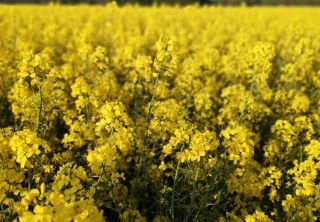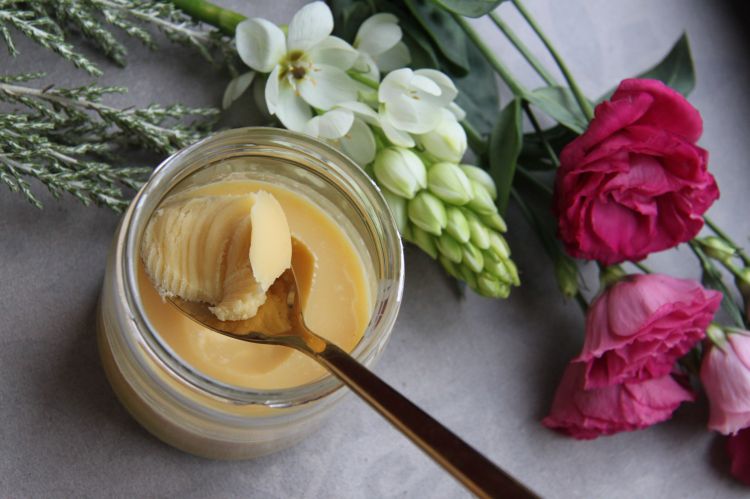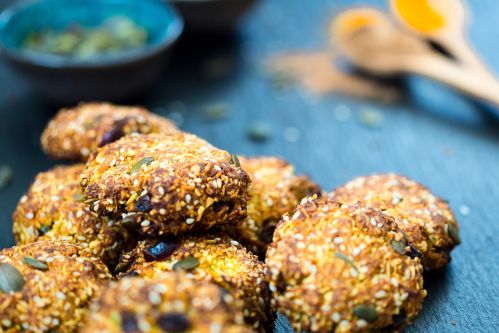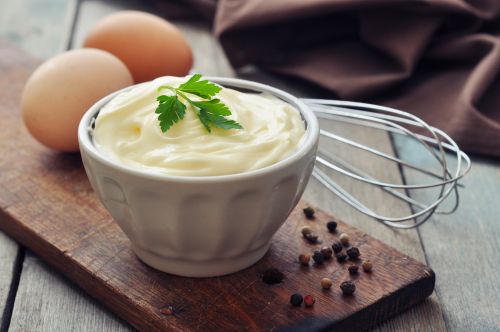ORGANIC Canola oil
virgin


EU agriculture
- gently and mill-fresh cold-pressed from unhulled organic rapeseed
- with regional rapeseed from the Weserbergland region
- high content of monounsaturated oleic acid
- suitable for steaming and frying
- for salads, dips, marinades and sauces
from 2422 ratings




Organic rapeseed oil is considered the most valuable edible oil with a wide range of uses in hot and cold dishes. The nutty flavor goes perfectly with salads and is also suitable for heating. Rapeseed oil, also known as rapeseed oil, colza oil or cabbage seed oil, is a vegetable oil and is obtained from the seeds of certain rapeseed varieties (Brassica napus L. and Brassica rapa L.) that have been approved in Germany since 1973.
The seeds of these cultivated plants are characterized by a very low content of erucic acid (0.0 to 2.0 %) and bitter substances (glucosinolates) compared to wild plants. This is what made rapeseed oil edible for humans and animals in the first place.
A very valuable vegetable oil is obtained from the oily seeds of the regionally and organically cultivated 00 rapeseed (free of erucic acid) in the first pressing stage at pressing temperatures below 40°C cold pressing, which also preserves the secondary plant substances such as lycopene, one of the carotenoids.
Due to its low content of saturated fatty acids, its high content of monounsaturated oleic acid and a balanced ratio of essential omega-6 to omega-3 fatty acids, edible rapeseed oil is a highly recommended edible oil for daily use in terms of nutritional physiology. Cold-pressed organic rapeseed oil can be kept for up to 12 months if stored as recommended (tightly closed in a dark bottle, protected from light and cool).
Rapeseed from Germany
Anyone who has ever cycled along cycle paths in the Weserbergland at the end of April to the beginning of May will hardly have missed the many yellow fields during the rapeseed blossom. But not all rapeseed is the same: we use organically grown rapeseed for our fine, cold-pressed edible oil. We know for sure that our rapeseed has not been artificially fertilized with liquid manure, sewage sludge or artificial fertilizers, that it has not been treated with herbicides or pesticides and that it has not been genetically modified. This is why we conclude fixed cultivation contracts with certified organic farmers year after year and are happy to pay fair prices - so that we can continue to reliably press cold-pressed, virgin organic rapeseed oil for you in our oil mill in the future. Our culinary delicacy, which we also call the "olive oil of the north", even surpasses olive oil in its content of polyunsaturated fatty acids.
Is rapeseed oil suitable for frying?
Rapeseed oil is a versatile cooking oil that can be used in both hot and cold dishes. Due to its fatty acid composition, it is also suitable for heating and can therefore also be used for steaming or baking. For frying, cold-pressed rapeseed oil should not be heated above 170° C. Due to its nutty taste, rapeseed oil is ideal for refining salads, which is why we use rapeseed oil in large proportions in our three salad oil variants - spicy, pithy and fruity.
Know how: Flash frying with rapeseed oil
If you want to use rapeseed oil for quick frying, you should first make sure that the pan is not too hot. A temperature of 170° C should not be exceeded under any circumstances. In practice, it has proven to be a good idea to heat the pan just before adding the rapeseed oil and then fry the food in it for three to a maximum of five minutes. This type of frying is therefore particularly suitable for sautéing and steaming vegetables such as peppers, onions or mushrooms.
Alternatives to rapeseed oil
If you are looking for a cooking oil specifically for frying, we can offer you our wok oil (made from a combination of peanut, sunflower and coconut oil) or the "High Oleic" frying oil as an alternative. Both oils can be heated to a high temperature and are therefore ideal for use in the pan.
Difference between cold-pressed and commercially available rapeseed oil
Virgin organic rapeseed oils are only cold-pressed mechanically on small spindle presses at low temperatures of below 40 degrees and are not subjected to any further treatment, such as refining. The quality of the oil depends on the quality of the oilseed. Virgin rapeseed oils contain a large number of secondary plant substances. They are characterized by a mild, typically nutty taste and have a natural, golden yellow color.
Conventional rapeseed oils are usually refined. They are subject to a physical-chemical process that greatly affects the natural consistency and properties of the oils as well as their shelf life. The refining of vegetable oils and fats is a processing step after the manufacture of these products according to the principle of hot pressing. During refining, accompanying substances are removed from the previously produced crude oil (trub oil) (e.g. pigments, odors, flavors and bitter substances), which can have an influence on the quality of the products. This mainly concerns taste, shelf life, technical processing, smell and color.
Two alternative refining processes are used.
Chemical refining:
- Degumming
- Neutralization (deacidification)
- Bleaching (decolorization)
- Deodorization (attenuation)
Physical refining:
- Degumming→decolorization→bleaching
- Attenuation→deodorization→distillative deacidification
In chemical refining, degumming first removes phospholipids, glycolipids, free sugars and metal ions from the oil. This is done by using diluted phosphoric acid. During neutralization, free fatty acids, which are contained in the oil at a rate of 0.3 to 0.6 g per 100 g, are separated using caustic soda.
Bleaching with bentonites and bleaching earths removes most of the colorants as well as residues of mucilage, soaps, trace metals and oxidation products. During steaming, steam distillation is carried out at approx. 180 - 220 °C to remove odor- and taste-intensive accompanying substances.
Due to the high temperatures involved in deodorization, the content of certain desirable by-products and nutritionally beneficial tocopherols in the oil is reduced.
In contrast to the hot pressing process, in which the crude oils (trub oils) are refined, this step is omitted in cold pressing, which is mainly used in decentralized oil mills. In this process, the crude oil (trub oil) is merely filtered.
The by-product from the production of vegetable oil using the hot pressing process is called extraction meal, while the by-product from cold pressing is called press cake. 3-MCPD fatty acid esters can be found in all refined, i.e. purified, vegetable oils, although the levels vary greatly in some cases. 3-MCPD was classified as a "possible human carcinogen" by the International Agency for Research on Cancer (IARC) in 2011. In addition, oils with a polyunsaturated fatty acid content produce so-called trans fatty acids, which have been classified as very harmful to health for many years.
Usage
The distinctly nutty taste harmonizes wonderfully with salads. Thanks to its relative temperature stability, rapeseed oil is also ideal for steaming and cooking, baking and frying. Rapeseed oil remains liquid in the refrigerator and is therefore particularly suitable for marinating cheese and antipasti.
Recipe

Vegan butter
Recipe for vegan butter with coconut and canola oil. Turmeric creates a natural yellow colour. Perfect as a spread or for baking. zum Rezept
Turmeric cookies
Delicious cookies with turmeric powder, spelt flour and oats. Refined with sesame and pumpkin seeds. With raisins for natural sweeteness. zum Rezept
Homemade mayonnaise
Recipe for homemade mayonnaise with cold-pressed canola or flaxseed oil. Mustard oil creates a piquant flavour. Refined with lemon juice and garnished with fresh parsley. zum RezeptRatings
Specification and ingredients
Canola oil
Average energy and nutrient content for 100 g
Please enjoy our products as part of a diverse and balanced nutrition.
As a product of nature the composition of the oil can vary, the given specifications are therefore average values.
Ingredients
Rapeseed oil, certified organicDurability
9 - 12 monthsLagerung
Store in a cool and dark place.Fatty acids diagram

Botanical name: Brassica napus L.
Origin:
The freshly harvested, unpeeled 00 rapeseed for our virgin rapeseed oil comes from controlled organic cultivation in the region, i.e. from the Weserbergland and neighboring federal states (Hesse, North Rhine-Westphalia). Organic made in Lower Saxony! In practice, this means that chemical fertilizers, sewage sludge and pesticides (herbicides and insecticides) are not used during cultivation. The farmers' cultivation guidelines prohibit the cultivation of genetically modified rapeseed varieties. Only organically managed farms supply us with freshly harvested winter and summer rapeseed. Independent organic inspection bodies monitor compliance with the producer guidelines in accordance with BIO VO 834/2007 and VO 889/2008. Products that have been grown and certified in accordance with these criteria may be awarded the BIOSIEGEL.
certification:
The oilseed used for our cold-pressed rapeseed oil comes from controlled organic cultivation certified according to BIO VO 834/2007 and VO 889/2008.
Regulation (EC) No. 1924/2006 of the European Parliament restricts nutrition and health claims made on foods. As of December 12, 2012, it is no longer permitted to refer to the nutritional and physiological effects of foods and food supplements. (Only the pharmaceutical industry is now allowed to do this. )
READING TIP: If you would like to find out more about vegetable oils, please refer to the following publications and websites:
Please note:
The (press) legal responsibility for all of the content there lies exclusively with the respective authors or authors/webmasters. We assume no liability for their correctness or their compliance with all relevant legal regulations.





 Peanut oil
Peanut oil Canola seed oil
Canola seed oil Sesame seed oil
Sesame seed oil Sunflower seed oil
Sunflower seed oil